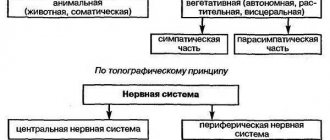“Identity crisis!” Erik Erikson would say and, adjusting his glasses, would put an end to the question. According to the psychologist, it is this crisis that turns a growing person from an “astronaut” or “nurse” into Dunno and Don’t Want. More precisely, teenagers express confusion and the wording “I don’t want anything” in response to endless questions from their parents, that they are in a hurry to make a decision regarding a university, specialty, profession and “in general, what do you think?!”
But at this time the child may be experiencing the loss of his own ego-identity, he is tormented by the question of self-determination: “who am I?”... Sometimes this poor creature does not even know what socks to wear, and he is required to decide who to be in the future? ! Yes, in adolescence, children do not even understand who they are in the present, they are in search of “I” - consciously or subconsciously. Erikson believed that at the stage of a student’s identity crisis, the main thing that is needed is non-interference from adults.
- One child experiences a crisis with intensified mental quests, and may even withdraw into himself, preferring peace and isolation. And a wise adult nearby will give him silence for reflection, but without losing connection and moderate control.
- For another child, on the contrary, external manifestation predominates, he needs attention and evaluation, tries on different roles and images, behaves in a confused and illogical way. A wise adult will not suppress such personal searches, but must also maintain connection and moderate control...
The problem is that an identity crisis manifests itself from 12 to 18 years of age (it also happens in adults, but in a different form). And if parents can still somehow cope with it, then the education system does not provide time and space for self-search, but requires self-determination in grades 8-10. No matter how mothers sigh and fathers frown, teenage confusion is a long-standing problem, although the psychology of today's high school students has its own characteristics.
Formation
At the age of 11-13, the will of a teenager begins to form. By the age of 15-16 she is completely ready. Sometimes at this age a child does not want anything: he does not know where to study, he is not attracted to any profession, and doing something makes him bored. This is not a critical situation, and in general it can be corrected, but it needs to be addressed.
In the modern world, this situation is not surprising. And rather, it is not psychological, but psychosocial. This is due to the fact that today's teenagers are growing up in timelessness. They are fascinated by everything that differs from the opinion of their parents. They are interested in what is not allowed.
The heroes of our time have also changed. How can a teenager choose a profession if they constantly talk about the power of businessmen on TV and on the Internet?
What's the difficulty?
Before thinking about how to choose a future profession for a teenager, you need to understand the main reasons why it is so difficult for modern children to make a choice.
In fact, for many this issue is like a natural disaster. It seems that just recently they were talking about “what I will become when I grow up,” and now we need to make the appropriate choice. Remember yourself at 15-16 years old: many continued to consider themselves children, although they tried to look and act like adults. Making a choice on which your entire future supposedly depends is not an easy burden.
If someone has already determined their future for themselves, this is immediately visible. Such children are self-confident, because they know for sure that in the future they will treat people, teach children or build houses. It is easier for them to decide which subjects to take in exams, what they should pay attention to, etc.
But this situation is becoming less and less common now. Many parents don’t understand how to help a teenager choose a profession, and here’s why.
What is the help of parents?
The task of parents is to give reasons for advice on how to choose a profession:
- Work through the teenager’s personal qualities by considering the options for a future profession proposed by the child, from the point of view of his character type, propensity for routine or active work, health status, and hobbies.
- Analyze employment issues: what professions are in demand now, will they remain at the peak of demand in a few years, when the young man or woman completes his education.
- Compare monetary remuneration in various fields of work - is it enough to meet the needs of life, pay for housing, and support a future family. Is there any opportunity for career growth in the chosen profession?
Parents can find information on the Internet and the media about the profession that interests the teenager in order to check the firmness and awareness of the choice.
It is undesirable to impose your opinion on what profession a teenager should or should not become. An unreasoned ban on a profession causes protest and stubbornness, a desire to prove the independence of choice.
Lack of interest
All modern teenagers are passionate about the same thing - social networks, computer games and parties. The child does not wander around abandoned buildings or entrances. At first glance, he is really busy with something, but how useful are such activities for his future?
Due to lack of interest, you have to think about how to introduce useful activities into your child’s “heavy” schedule that will help him choose a profession. But, as a rule, he has neither the desire, nor the energy, nor the strength for this.
But there is also an explanation for such a manifestation. Most teenagers are simply afraid of making mistakes. If you don’t want anything, then you don’t have to do anything, and therefore you will never make a mistake.
Many hobbies
This is the opposite problem to the previous one. Some children cannot decide what to do because they like everything. In fact, this is not the biggest problem, since now there are a lot of professions, and some of them allow you to combine incompatible things.
Yes, at first you will have to think about how to help a teenager decide on a profession. But when this period is over, the child will find a very unusual and interesting activity. For example, if he is interested in computer games and journalism, why not become an esports journalist?
Ignorance of self
Modernity, unfortunately, has brought many children to the point where they strive to be like someone else, completely forgetting about their individuality. Some people copy stars, athletes or other public figures, while others want to be like their classmate or friend.
This is a very serious problem. The child cannot understand his own characteristics and abilities. He believes that he is not capable of anything, that he cannot do anything. It’s good if a child has been showing his talents for a long time, thanks to which you can at least understand the direction in his future profession. Otherwise, you will have to contact a psychologist who would point out to parents the characteristics of their child.
Ignorance
This is one of the common reasons why many people do not understand how to decide on a profession. Teenagers have no idea about specialties. Of course, if we are talking about bloggers or businessmen, then everything is clear to everyone. But what do they study at the Faculty of Systems and Media? What can you become after receiving a degree in International Relations?
Many teenagers represent most professions, looking back on what they were taught in kindergarten. Therefore, it is easy for them to navigate what a cook, a policeman and a doctor can do.
This is the fault of everyone: teachers who do not talk about professions, the media, which could also be engaged in education, and on the Internet you also need to specifically search for the necessary information. Therefore, all that remains is the parent, who can learn a lot of interesting things himself and help the child expand his knowledge.
Uncertainty
This reason could be combined with the first one, which states that teenagers are not interested in anything. But it is worth highlighting separately, since the problem is really very serious.
Some teenagers may be sure of what they want, but will still continue to doubt. For a child, the period of choosing a profession is not easy, at least because it is something new, unknown, and also requires such high responsibility. And what will happen next? What if I was wrong? What if it's not mine?
It is extremely important to explain to the child that there will be difficulties and they cannot be avoided. There will be doubts, but this is not a reason to refuse the interesting adventures that await him ahead. And a mistake in choice is not death, but only an opportunity to start doing something new.
How to help a child choose a profession consultation (9th grade) on the topic
Speech by a psychologist at a parent meeting “How to help a child choose a profession”
An important problem of adolescence is the choice of profession. As a rule, the question of choosing a future work in life arises before a student after finishing 9th grade. But psychologists recommend that parents think about their child’s career guidance already in the 7th–8th grade.
During this age period, the interests of a significant part of the children are extremely unstable. They are generated by acquaintances and comrades. School and family have less influence. The degree of choice ranges from absolute “yes, this is the only profession that attracts me” to “I don’t know how it will work out.”
Research by psychologists has shown that teenagers prioritize professions that provide the opportunity to make independent decisions, contact people and receive a useful product of activity. In second place are professions in which there is a creative nature of work. In third place is work from which you can get new impressions. Recently, financial reward for work done has become an important factor influencing the choice of profession.
It would seem that everyone cares about their own future. But what is surprising is the unreasonable ease with which a certain part of young people regards choosing a profession.
Motives that guide students when choosing a profession:
Long-term work with school graduates shows that students, when choosing a profession, are guided by the following characteristics. We have ranked them in priority order:
- Firstly, most of them want the profession to be prestigious and to be recognized in society. Having become representatives of such a profession, they think that they automatically become respected and financially secure people. However, you need to know that public recognition of professions changes significantly over time. For example, just recently, 20-25 years ago, it was considered prestigious to have a higher technical education. And many young people, having graduated from school, flocked to technical universities. Having completed them, they were distributed to various design bureaus, design institutes, research institutes, scientific and production associations, to factories and factories as engineers. So what happened? Changing economic conditions have led to a decrease in demand for engineers and a drop in the prestige of this profession. And many of those who were focused only on the prestige of the profession remained behind the gates of the enterprises.
- Secondly, many would like to acquire any profession, as long as it pays well. However, they do not take into account or do not know that it is not the profession that is paid, but the position that they will occupy. It turns out that it is not enough to get a profession in order to earn a lot later.
- The third reason why people choose a profession is interest in its content. And this is one of the most compelling reasons for professional choice.
- Working conditions are most often given fourth place among the reasons for choosing a profession. The reason is significant, but it is also connected not so much with the profession as with the place of work, since any profession involves a fairly wide range of possible jobs. And the higher the level of qualification of a young person, the wider his opportunities in choosing a place of work and, accordingly, working conditions to his liking.
- The fifth place among the motives for choosing a profession is usually the availability of training. Very often, people choose the profession that is easier to acquire: they enroll in the educational institution that is closer to home, or where financial opportunities allow them to enroll, or where they can help them enroll. In most cases this is a good reason. However, focusing only on the availability of training, the possibilities of professional choice are greatly limited.
- The sixth reason is the desire of parents or the advice of other people. Are you sure that you know the modern job market and the professional qualities of your children well enough?
- The seventh reason is choosing a profession in accordance with your abilities. This reason is very important when choosing a profession.
- The eighth reason is the example of other people. This happens if a young man goes to study with someone else. In this case, you choose your profession in accordance with the interests and abilities of your friends and comrades, and not your own.
- And in last place among the reasons for choosing a profession is the possibility of employment.
According to sociological studies, schoolchildren in their choice of a future specialty rarely focus on personal psychology, their personal qualities, relying, rather, on the financial capabilities of the family, and completely trust the decision of their parents. And mothers and fathers, guided by widespread stereotypes in society about the prestige of the professions of lawyer and economist, doom their children to fierce competition and a difficult job search after receiving a diploma.
Psychologists blame adults for frequently ignoring the “mental” side of a “professional” issue. Teachers also never tire of reminding parents that a graduate’s future problems (from employment and the need for retraining to an unsettled career in adulthood) are rooted in school life. The verdict of vocational consultants is this: if the child is not given the opportunity and time to choose an activity “close to his heart” in time, future work threatens to turn into hard labor for the young specialist.
Thus, we can roughly outline the following main priorities in the professional self-determination of young people:
1. Help in finding personal meaning for a teenager not only in relation to attractive chosen professions, but also in relation to professions that “have to” be chosen even against the initial desire. To do this, he needs to know himself, the characteristics of his character, identify his interests and abilities. This can be done with the help of a career consultant who, based on the results of an individual conversation and psychological diagnostics, will help the child set the main priorities when choosing a profession.
2. Gradual formation in young people of the ability to predict the development of chosen professions in the near future; refusal to unconditionally focus on existing “fashions” in relation to a rather limited number of professions such as lawyer, economist, manager, i.e. the teenager’s orientation towards real demand in the labor market, and not at the prestige of the chosen profession.
^ Factors for choosing the right profession:
What should you consider when choosing a profession? What human qualities are professionally important? Thanks to what can a person achieve success in his professional activity, doing it without much effort and stress, and, moreover, receiving satisfaction from it?
To help a teenager choose a profession, it is necessary to be guided by three positions in choosing a profession:
I want - the interests, inclinations of the child, the desire to do something that interests him;
I can - level of preparedness, level of knowledge, availability of abilities for the chosen type of activity, compliance of the student’s health with the chosen profession;
necessary - the demand for the profession, the need for it in society.
First of all, a person’s interests and inclinations matter. Inclinations are desires, aspirations not only for the result, but also for the very process of what a person does. If your child likes the content of his work, he will be more willing to work, improve his professional qualifications, gain authority among others and, ultimately, earn more.
Also, one of the most important points that must be taken into account in the process of professional selection is professional suitability. Requirements for a person’s health status, requirements for his professional qualifications and requirements for professionally important qualities determine professional suitability. Of these three components, only the level of professional qualifications can be significantly increased according to your desire.
When it comes to health, the ability to change it can be quite limited. Therefore, if your child suffers from a chronic disease, there may be medical contraindications to certain professions. It is possible to determine whether a young man has any contraindications due to his health condition only as a result of a medical examination. If a person has no medical contraindications to a particular profession, then he can be considered suitable for it. The state of health of most people allows them to master a fairly wide range of professions.
But the greatest interest in terms of choosing a profession is a person’s abilities. The concept of abilities helps explain why people differ in the degree of success in their professional activities.
Each person can, to one degree or another, learn new things, remember, reason, imagine, analyze, make decisions, influence other people, and so on. In other words, people have many abilities. Abilities are usually divided into general and special. Regardless of the content of professional activity, any specialist must be able to learn new things, communicate with other people, and manage their behavior and condition. These are general abilities, which are also called intelligence.
Of course, the success of professional activity depends not only on general intelligence, but also on other abilities. For a person to master any profession well, a high level of mental development is often not enough. Sometimes, depending on the specialty, other special abilities are required: technical, mathematical, artistic, musical, organizational, pedagogical, artistic, sports.
If your child has a high level of development of learning abilities, then his professional choice is almost unlimited. He will be able to freely cope with both executive and creative professions. But if he has difficulties absorbing new information, analyzing complex situations, if he does not have a sufficiently high level of development of the ability to concentrate attention on the tasks at hand, he has a slow pace of mental activity and low endurance for prolonged mental stress, then you have two paths:
- through systematic study, training and exercises, accumulation of knowledge, mastering the skills of mental activity and expanding cognitive processes, develop his intellectual abilities;
- limit his choice mainly to professions that do not require long training, analysis of complex situations, making responsible decisions, organizing one’s own activities and the activities of other people.
Note that a fairly large number of schoolchildren and their parents are focused on obtaining higher education. But we should not forget that a certain number of teenagers are not inclined to engage in mental activity at all. It will be much easier for such children to find themselves if they begin their education in vocational schools, lyceums (NPOs), colleges, and technical schools (SPOs). This often helps with subsequent admission to higher education. A teenager receives knowledge and ideas about his chosen profession in secondary educational institutions. And if desired, he will be able to study further purposefully.
The emergence of the need for self-determination indicates that the adolescent’s personality has reached a high level of development. If such a need does not arise, you should not force him to make a decision. Attempts by parents, especially in families of the intelligentsia, to speed up this event, this process with the help of psychological pressure, always lead to a reaction of protest or an increase in anxiety. It has been noted that early self-determination usually has its costs, since hobbies in adolescence are often accidental and frivolous. A young person may have a poor understanding of the activities he will have to engage in.
Thus, it is very important to help a young person make the right choice of profession. Favorite work helps to reveal the brightest sides of the personality,
Below are the rules that, if followed, will allow parents to help their child make a more appropriate choice of profession.
Rules for parents!
- Do not try to choose the path of life for your children, since the choice made by others will in the near future lead to failure, dissatisfaction, and disappointment.
- Talk with your son or daughter about topics related to choosing a profession, trying to tell as much as possible about what the life path he or she is choosing is like.
- Remember that every generation and every child has the right to their own individuality. And in accordance with this, he has the right to make his own choice, even if his parents do not like it. He has the right to his own search, in which he can be helped, but on which he cannot be insisted.
- The elite nature of the profession is not always good for the child.
High expectations
Despite the fact that Generation Z spends energy on results and not on rewards, many teenagers still want to immediately receive a high salary. Many people have high expectations from their professions.
If you go to study to become a programmer, it means that in the near future you will be able to buy an expensive laptop and sit in cafes doing freelancing. But you should understand that a lot depends on the level of knowledge and a little on luck.
After all, history knows many examples of successful people who did not even finish school, but became popular in some area. Some people can spend their whole lives studying a particular specialty, but remain mediocre in their field.
What profession should a girl choose?
The dream of many girls to become a movie star, model or famous singer is often limited by the lack of personal data for such a profession. Therefore, the criterion for what profession a girl should choose is material support, accessibility, lack of physical activity, and indoor work.
Before going to study, it is advisable to be firmly confident that upon completion of the educational course, the girl will not join the ranks of unemployed specialists. It is important for parents to understand that their child’s profession should be chosen not based on which job pays the most money, but what the girl’s soul is in, what her talent is developed in. And even if she enters a prestigious university for a technical specialty that is in demand, and her soul lies in art, then there is a high probability that she will not be able to find herself in the profession of an engineer, but will become a successful nail designer or makeup artist.
The most in-demand professions:
- accountant;
- tourism manager;
- designer;
- cosmetologist-stylist;
- advertising specialist;
- computer equipment maintenance;
- working specialties on CNC machines.
Earnings for selected professions depend on the category of specialist, suggesting career growth. What profession a girl should choose depends on her individual characteristics, test results, and family financial capabilities. Consultants from the psychological service will select the most suitable specialty.
the main role
No one can help your child better than you. But it is extremely important to understand that some of them cannot even master literature for the summer, and you want him to choose a profession for life. You can give advice and support to your teenager, but it is extremely important not to impose your unrealized dreams and desires on him.
You will have to find out how to decide on a future profession for a teenager. Unfortunately, the statistics are such that almost half of the people who choose a faculty do not work in their profession after graduating from university. But you shouldn’t be afraid of this, since even choosing a not-so-successful specialty can open up something much better and more successful for a person.
But many parents want to know how to help a teenager choose a future profession. There are several tips that may be effective.
The system is flawed, and we are its flawed servants.
Some children decide on a direction as early as middle school and stubbornly follow it until they get a job. These are the minority. The rest, already in high school, try to choose a profession, a model of being, a worldview and a way of life. But not everyone does this. This problem is complex, its formation is influenced by:
- Features of the development of the psyche of an individual person and his generation, as indicated above;
- Parents and immediate environment;
- Education system;
- Economic and political situation in the country and in the world.
Why go to school and university
We will dedicate the lines below to parents. In the meantime, let's complain a little about the system. Education in public schools does little to develop students' independence in thinking and action. The technique encourages obedience, memorization, and adherence to boundaries. At the same time, he does not like going beyond boundaries, self-expression and developing his own opinion, although he shows loyalty to creativity. Of course, in individual schools, in the approaches of individual teachers, there is a shift in emphasis in one direction or another, but these are exceptions.
Over time, the student-teacher relationship becomes purely about earning grades. Children whine, they say, why study, why go to school... They are not yet ready to think for the future and do not understand explanations. A heavy shadow of the system hangs over the unformed soul, psyche and consciousness: finish school - go to university - then go to work and not a step left or right.
And now - a vicious circle. Those who go to university without the desire to study graduate as dummies, so employers, faced with masters on paper and smart sophomores, look less and less at the “crust”. Due to the fact that without a diploma you can get a well-paid job, schoolchildren do not see the point of wiping their pants for another 5 years for the sake of one specialty. Adding fuel to the fire, in recent years some professions have become obsolete, while others are on the verge of extinction, so adult specialists have to retrain. Thus, due to a lack of motivation to study at a university, teenagers do not know where to enroll, and if they do, they are reluctant to study and end up empty-nesters.
What to do?
To figure out whether you really need to go to university and why? For training for a future profession? Ah, blessed is he who believes! Few of our universities teach a profession; it comes with experience in the specialty... But for self-development, yes. To broaden your horizons - yes. To learn how to obtain and process information - yes too. Even just to delve deeper into an area of interest and enjoy the fact that studying is like a hobby! Then the child will learn! And it’s not scary that you won’t go to work in your specialty. But he will be a mentally healthy and educated person, and the profession is a gainful one. Moreover, there will be time to think and to mature psychologically, plus the university instills general developmental disciplines that help to mentally prepare for adult life, form a worldview and career preferences.
What will tomorrow bring
I decided on a profession back in 7th grade. I wanted to become a journalist so I could travel frequently on business trips. However, by the time I got a job, the Internet appeared. The more it developed, the more the correspondents' business trips came to naught.
What we see in the labor market today: not only the work patterns of individual specialties are changing rapidly, some professions are completely dying, some are deformed beyond recognition, but how many new ones are appearing?!
In part, this inspires, strengthens stress resistance and stimulates learning to quickly adapt to new things. Partly it instills fear and uncertainty about the future, which runs through among parents and is passed on to children. Moreover, an inquisitive mind, interest in adult topics and freer access to the Internet allow even a 10-12 year old schoolchild to understand that tomorrow everything can change dramatically: a war will suddenly break out in a quiet, cozy city, some countries will disappear from the map I chose today the profession will no longer be in demand in a couple of years... Do you think, observing the precariousness of the world and the transience of change, can today’s 8th-9th or even 11th-grader decide on their future profession and does this make sense?!
What to do?
Don’t intimidate your child that his specialty is the guiding thread of his life! Make sure that the high school student chooses not a profession, but a direction in which he can develop his inclinations and talents.
I'm already 45, and I still haven't decided what I want to become.
Parents wish their child well and try to suggest what is best. But how do they know what’s best for him? They often set the wrong course and confuse you. This happens when adults near a teenager:
- with limited horizons;
- cannot give up their own complexes and phobias;
- insist on a specific profession that is not close to the child;
- they prevent the student from thinking, they constantly drip on his brain;
- have a biased attitude towards children;
- ruined the relationship with the child and are anti-authority for him;
- They themselves don’t know what they want in their life.
Yes, yes, among older generations the phenomenon of confusion, misunderstanding of one’s desires and goals, dissatisfaction with life and the search for new roles is also common. Psychologists state: such searches are a sign of the individual’s need for development. If, by experiencing it, a person improves himself, studies and practices something new, developing, creative - this motivates the teenager. But it has a destructive effect on the child if, instead of self-development, parents fall into a stupor, depression, irritability, anger, they themselves do not know what they want and make contradictory illogical demands to others (relatives, subordinates).
Independence
It is very important that your child is independent. It is unlikely that such a character trait can be instilled a couple of years before admission; by and large, it is advisable to do this from birth. But if you are just now thinking about it, then start right away.
Independence will help the child choose his own profession. Otherwise, he will listen to the parent’s opinion or advice, and then will blame them for his lack of fulfillment.
Demand
It is equally important to choose from those professions that are in demand in your country or city. Of course, you can get a specialty that will require moving, but you should talk about it and plan right away.
When it comes to the question of the demand for a profession, it is worth understanding that we are not talking about prestigious specialties, but specifically about those in which one can find a job. To do this, you can use the ratings of local employment centers.
You can also pay attention to more universal specialties. For example, now knowledge of foreign languages is definitely suitable for everyone, since with them you can get several completely different professions at once. For example, a person graduated from English philology, but did not go to work as an English teacher, but became a journalist for a foreign publication.
Studying professions
Ignorance of professions is one of the main reasons for difficult choices. You probably have many friends who have a variety of professions. Ask them to talk about their specialty and nuances that are not even known at the training stage.
Some organizations also hold open days. But in this case, it is better to be interested in hidden details that are usually not discussed at presentations.
What profession should a boy choose?
According to labor market research, professions in the following specialties will remain in demand over the next 10–20 years:
- engineers, builders with higher education;
- transportation;
- product advertising and sale;
- nanotechnology;
- service sector;
- conservation experts;
- medical workers;
- chemists, biologists.
In order not to be left behind in life, you should decide in advance what profession the boy should choose. Many universities, colleges, and technical schools regularly organize “open days”, when anyone can come and get acquainted with the conditions of future study, the basics of the specialty being acquired, and listen to feedback from those working in the profession. Many guys today are interested in how to become a programmer, since this is also one of the successful professions for those who seriously and responsibly pursued it.
It would be a good idea to contact specialists at the Employment Center to determine the boy’s aptitude for any field of production. It is also recommended to take tests to determine the recommended area of application of your abilities.
Effective protection against unemployment is the acquisition of several related specialties. A generalist has an advantage when hiring.
Every teenager wants their parents to understand their aspirations and provide them with full support. Choosing a profession is an important step into adulthood, and if you need help from adults, it is better to lean on your parents’ shoulder.
Search for studies
How to choose a profession for a teenager? Psychologists recommend paying attention to specialties outside your city or country. This advice is especially useful for those who live in small towns where there are a limited number of educational institutions.
By looking at the capital's universities, it will be easier for you to understand the opportunities that are open to your child. There is always a large number of different specialties here. But there is another side to the coin - moving a child to another city. Here, not every parent is ready to support their child, especially if there are problems with independence.
On what basis do teenagers choose a profession on their own?
The choice of profession is influenced by:
- Parents, especially if there are labor dynasties, where the child almost automatically inherits the profession of the older generation, about which he has heard a lot in previous years and has the greatest understanding. The desire to go their own way in such families is usually met with hostility.
- Advice from friends - to go to a university or vocational school with a friend or girlfriend - is always relevant.
- The so-called “fashionable” professions, for the implementation of which sometimes there are not enough funds, there are no necessary qualities, knowledge of what you will have to do, but “you really want to.”
- School grades in certain subjects often influence future job choices.
The attitude towards work is ingrained in every family from a very early age. Having a child, it should be taken into account that the choice of life position often depends on carelessly spoken words, such as “work is not a wolf...”.
The benefits of career guidance tests
If it is necessary to figure out how a teenager should choose a profession, most parents believe that they should immediately search for appropriate tests that will help, or at least hint at the future. But it's better to forget about them.
Career guidance tests, especially on the Internet, are absolutely useless, so psychologists advise not to even pay attention to them. They have a limited number of professions, and trivial questions actually do not give an objective result.
Self-realization in the profession: deep motivation
It is very important to figure out what interests you, what brings you joy and pleasure. What motivates you to work or activity? Apart from reward or punishment. Only after receiving answers to these questions can you choose a direction. Doing this on your own is extremely difficult. The pressure of parents who dream that their child will continue the family business or dynasty is perhaps the main obstacle to self-realization. It is also difficult to resist the appealing slogans of prestigious universities, the examples of friends who claim that their experience is perhaps the only true path.
In fact, a person will be happy only if he makes a conscious choice of a profession he likes without pressure, based on his own preferences and interests. He will receive joy from doing what he loves, benefiting other people and realizing his inner potential. Self-realization of a person occurs throughout life, until old age. And this fact allows us not to give up, to constantly gain new knowledge, gain experience, and achieve even greater heights in our activities. For some it is one choice for life, for most it is a series of choices, like crossroads on the road that lead along their own unique path.
Mandatory admission
How to decide on a career choice for a teenager? Psychologists believe that the child may need a little more time. Some guys go to work, and only after receiving such experience do they begin to understand what they need in life. In addition, such a decision will definitely play in favor of developing independence.
After school, you can go to college: it is not as expensive as a university, and it is easier to get into it. In addition, after 3 years, your child will already have acquired a profession, will be able to visit a potential place of work several times, and also understand the correctness of his choice.
“Eternal students” – a special kind
Quite often in my practice I come across a rather interesting category of people. They are called “eternal students”. They successfully study at one university, then brilliantly graduate from the second, third and even fourth. As a result, they never manage to find their path, their specialty and enjoy their work. Some are helped by their parents to the best of their ability, others have to make do with odd jobs, and still others manage to enter into a successful marriage that solves their financial problems.
For such people it is very important to conquer peaks, but real activity is not so “high”. And of course, in reality they do not feel like happy, fulfilled people. The same thing happens to those who endlessly change jobs, never staying in any one place for more than two or three months. For such people, studying and an endless search for work become the norm of life. At the same time, they are not aware of their actions, believing that others are to blame, and not themselves.
They lack the time and desire to pause, stop and soberly assess the situation. What exactly prevents success? How can another diploma help you get ahead in life? How much better will the new place be than the old one? Such a person will find a lot of excuses for his own behavior, but will never admit that for him this is just a way to escape from the problems of real life. Only a lucky chance or the help of a professional can change the situation.
Compulsory education
How to choose a future profession for a teenage girl or boy? Psychologists say that you need to listen to your child. If he has already made his choice, but during the learning process he realized that it is completely not for him, you should not force him to study.
From 18 to 23 years of age there is a sharp maturation. It is because of this that many decide to leave the profession they chose as a schoolchild. Of course, it’s good if the child justifies his action and talks about his future plans. Perhaps he found another hobby.
A diploma is not a reason to force a person into a framework. He must understand that his tastes and outlook on life may change, so he should be prepared for the fact that at some point he will change his mind and quit his chosen occupation. Explain to the teenager that there is nothing wrong with this, but this is an everyday matter.
Professional help
Consulting a psychologist for career guidance and diagnosing abilities is a sure way to objectively assess the situation. Together we will understand your inclinations, true interests and desires, and consider the directions in which you can realize yourself. You will learn not only to make the right choice for yourself, but also to make independent decisions and take responsibility for them.
In some cases, it is also necessary to work with parents. Sometimes you need help in understanding your child, sometimes it is necessary to expand the range of possibilities and choices. It happens that you also need to understand that each person has his own path. No matter how invaluable experience is, you should not impose your opinion and vision of life on children. The desire to protect a child from possible mistakes leads to the opposite - they become unhappy, live in a state of constant stress, experience frequent depression, are not realized as a person, and suffer from psychosomatic disorders. And this is a direct road to problems not only in life, but also with health. To avoid the wrong path and live a full, rich, interesting life, do not neglect the help of a professional.
Pay maximum attention to self-determination, learn more about your strengths and factors that cause stress. This choice is one of the most important and important in life!
Adolescent and family psychologist Olga Gavrilyuk









